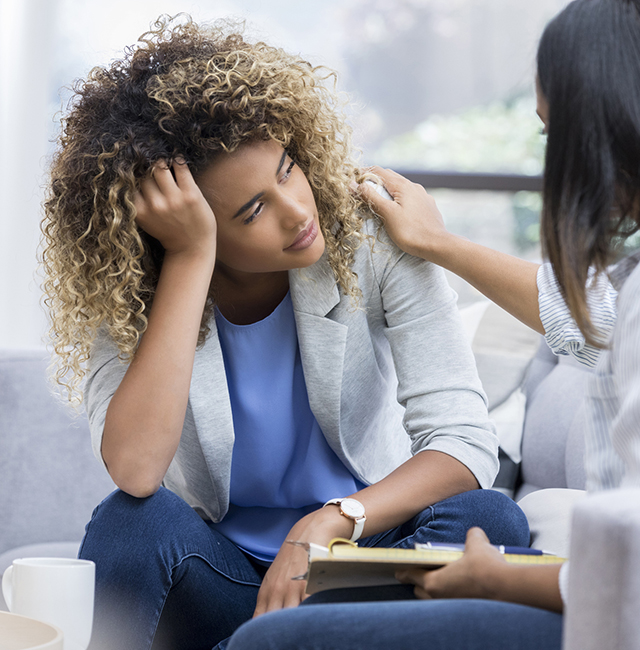Phone calls. Mail. Zoom meetings. Check-ins with social distancing. These are some of the ways the staff at Creative Alternatives, a program that serves adults who have serious and persistent mental illnesses, is working diligently to maintain their trademark personalized approach with each of their 177 members during the pandemic. The plan appears to be working.
“Some days are hard, and some days are easy, but I know I always have support,” says Creative Alternatives member Rachel. “Just hearing their voices helps me know I’m not alone.”
Creative Alternatives is an integral part of the Community Psychiatry Program at Johns Hopkins Bayview Medical Center. Funded by grants from the Behavior Health Systems of Baltimore, the mental health authority for Baltimore City, Creative Alternatives receives a set amount of money for each qualified participant, deemed member, to help them lead successful lives in the community.
The program provides a full range of psychiatric services, including mental health treatment, substance use disorder treatment, rehabilitative and vocational services, in addition to assistance with daily living. Members grappling with anxiety, depression, schizoaffective or personality disorders have the opportunity for community integration, personal growth and employment.
Normally, more than 50 members arrive at Creative Alternatives’ office every day to participate in groups, off-site appointments and meetings with staff. The staff strives to provide each member with not only treatment, but also hope, empowerment, responsibility and meaningful roles.
Rachel, a Creative Alternatives member for five years, says the program helps her feel more stable, even during this unprecedented time.
“I talk to my caseworker once a day or more, and my therapist calls once a week. I can get in touch with them at any time,” Rachel says. “We also have Zoom meetings, and all you have to do is click into the meeting. It’s easy. I can see everyone, and we can all talk as a group. I like getting input from other members.”
Rachel is quick to add that Creative Alternatives’ support has helped her stay out of the hospital.
“This is the best I’ve ever done,” she says. “They help you get stabilized with your medication, and they’ve taught me coping skills. I’m able to stay clean, stay on track and stay healthy.”
Staff nurse Ed MacSherry said Creative Alternatives strives to develop a level of trust with their members, and those interactions have helped staff navigate clients’ struggles during the pandemic.
“Those relationships help us give them the best service possible,” says MacSherry. “Over the past month or more, we’ve had to rely on those relationships to continue to provide these services. We’re reaching out daily and sometimes more.”
MacSherry adds that the staff has been mainly using the telephone to keep those relationships intact.
“Many of our members have limited resources and are inexperienced with using computers,” he says. “We’re still learning how to manage these challenges and being able to connect with the members by phone has been so useful. We also have a 24-hour crisis line that we make available to our members. This change in routine is difficult, and we’re helping them cope as best we can.”
Cullen, who has been a Creative Alternatives member for more than two years, says having his caseworker check in helps him stay calm during the pandemic.
“He checks in a couple of days a week and stops by to see how I’m doing. I like that I don’t have to travel as much to get support. I used to take two or three buses to get the program,” Cullen says. “Life was pretty hectic before Creative Alternatives. I couldn’t control my mood, and I was in and out of the hospital. They got me on the right medications, and I’m doing talk therapy. It’s been great to have someone to talk to.”
Dallas Strohl, clinical supervisor of the vocational program, says staying in constant contact ensures that members remain fully supported.
“We’re still helping them with their goals while distancing,” Strohl says. “I think it’s nice that our members can get support from the comfort of their own homes. We’ve established a vocational group that they can call into weekly. They can ask all their questions, and we help them plan and coordinate down to every last detail.”
Despite the pandemic, Strohl says three members have recently gotten new jobs, and three more have returned to their jobs, after being furloughed.
“They’re still motivated to get out there and be a part of their community,” he says. “We always strive to help our members to become independent and maintain stability. It’s exciting to see how much they want to succeed and how much they appreciate their roles.”
Community support assistant Roseann Richardson says that during this time of crisis, many members have been suffering with increased anxiety and depression brought on by the stay-at-home order. Members accustomed to coming to Creative Alternatives five days a week are missing the routine and socialization the center offers.
“I’ve been calling or sending texts to keep them motivated. Sometimes it’s as simple as chatting by phone and letting them talk — just listening,” Richardson says. “The first thing I do is remind them to use their wellness tools. These are activities that make them feel calm and lessen their stressors. For example, I’ll say, ‘I remember you said you like to write poetry. Have you tried to write a poem?’”
Richardson also keeps in touch with the members through a newsletter that offers updates, puzzles, recipes, movie and music websites and a resource list.
“It lets them know that they are still in our hearts and minds,” Richardson says. “We miss them as much as they miss us. I hope it helps them to keep calm, stay positive and know that we’ll see them soon.”



